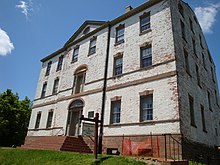William Franklin
William Franklin FRSE (22 February[citation needed] 1730 – 17 November 1813) was an American-born attorney, soldier, politician, and colonial administrator.
In 1750, Benjamin Franklin told his mother that William was nineteen years old,[2] but this may have been an attempt to make the youth appear to have been conceived within marriage.
[2] There is some speculation[3] that Deborah Read was William's biological mother, and that because of his parents' common-law relationship, the circumstances of his birth were obscured so as not to be politically harmful to him or to their marital arrangement.
William joined a company of Pennsylvania provincial troops in 1746 and spent a winter in Albany in King George's War, obtaining the rank of captain in 1747.
She was born in the English colony of Barbados to the sugar planter John Downes and his wife, Elizabeth (née Parsons).
She was interred beneath the altar of St. Paul's Chapel in lower Manhattan, where she had resided after the British evacuated Perth Amboy.
William and Benjamin Franklin became partners and confidants, working together to pursue land grants in what was then called the Northwest (now Midwest).
Before they left England, Benjamin lobbied hard to procure his son an appointment, especially working with the Prime Minister Lord Bute.
Randall states: Franklin proved an able governor; avoiding quarrels with the assembly, he put forth effort to bring about popular reforms, such as the improvement of roads and construction of bridges.
The Delaware Indians nicknamed him "Dispenser of Justice" after he hanged two Sussex County men for beheading a prisoner during the Pontiac Rebellion.
After Benjamin Franklin was systematically ridiculed and humiliated by Solicitor-General Alexander Wedderburn before the Privy Council on 29 January 1774,[further explanation needed] he expected his son to resign in protest.
[16] His Loyalist position was a reflection of his respect for benevolent authority which he felt was embodied by the British Crown, a view consistent with his father's earlier Anglophilia.
After the Declaration of Independence, Franklin was formally taken into custody by order of the Provincial Congress of New Jersey, an entity which he refused to recognize, regarding it as an "illegal assembly".
[22] While in New York, Franklin tried to encourage a guerrilla war and active reprisals against the rebels but was frustrated by British Commander-in-Chief General Henry Clinton, who did not support the idea or had much use for American Loyalists.
Nonetheless, Franklin coordinated a multi-colony group known as the Associated Loyalists that waged guerrilla warfare in New York, New Jersey and Connecticut.
During a raid, Loyalist troops under Franklin's general oversight captured Joshua Huddy, an officer of the New Jersey militia.
Huddy was a member of the Association of Retaliation, a vigilante body with a history of attacking and killing Loyalists and neutrals in New Jersey.
When he heard of Huddy's death, General George Washington threatened to execute Captain Charles Asgill, a British officer who had been captured at Yorktown, unless Lippincott were handed over to the American military.
Due to the intervention of the French King Louis XVI, who interceded with his American allies to prevent Asgill's execution, the British officer was eventually released by the Continental Congress, where it was agreed he should return to England on parole.
Despite the speed with which it was terminated, the Asgill Affair temporarily stalled peace talks between American and British authorities, extending uncertainty over the United States' prospects.
The Surrender at Yorktown in October 1781 dimmed British hopes for victory, and in 1782, William Franklin departed for Britain, never to return.
His father never accepted his royalist position, but he responded in a letter dated 16 August 1784, in which he states "[We] will endeavor, as you propose mutually to forget what has happened relating to it, as well we can.
He stated in the will that the way William "acted against me in the late war, which is of public notoriety, will account for my leaving him no more of an estate he endeavoured to deprive me of.

